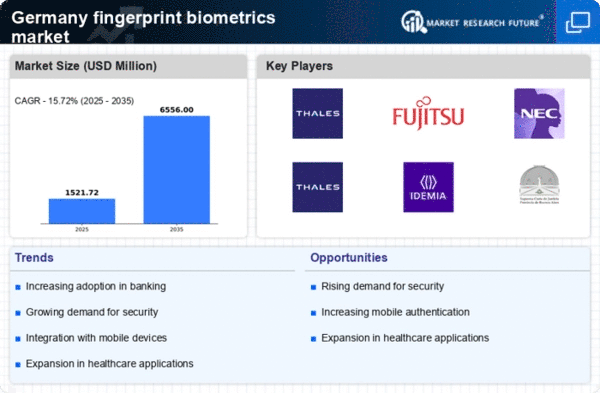Technological Advancements
Technological advancements play a pivotal role in the expansion of the fingerprint biometrics market. Innovations in sensor technology, software algorithms, and data processing capabilities enhance the accuracy and efficiency of fingerprint recognition systems. In Germany, the introduction of advanced fingerprint scanners that utilize artificial intelligence is gaining traction. These systems not only improve user experience but also reduce the likelihood of false positives. As organizations seek to modernize their security infrastructure, the market is expected to witness a surge in demand, with projections indicating a market value of €1.8 billion by 2026.
Increasing Security Concerns
The The fingerprint biometrics market is experiencing growth due to escalating security concerns. Individuals and organizations in Germany are increasingly prioritizing reliable authentication methods. With rising incidents of identity theft and cybercrime, there is a heightened demand for reliable authentication methods. The integration of fingerprint biometrics into various sectors, including banking and healthcare, is becoming more prevalent. In 2025, the market is projected to reach approximately €1.5 billion, reflecting a compound annual growth rate (CAGR) of around 12% from previous years. This trend indicates that businesses are increasingly prioritizing security measures, thereby driving the adoption of fingerprint biometrics solutions.
Rising Demand in Law Enforcement
Law enforcement agencies in Germany are driving a surge in demand for fingerprint biometrics. The need for efficient identification and verification processes in criminal investigations is driving the adoption of advanced fingerprint recognition systems. These technologies enable law enforcement to quickly and accurately match fingerprints against extensive databases, enhancing public safety. In 2025, it is projected that investments in biometric technologies by law enforcement will exceed €500 million, reflecting a commitment to leveraging innovative solutions for crime prevention and investigation. This trend underscores the critical role of fingerprint biometrics in enhancing security measures.
Growing Adoption in Mobile Payments
The fingerprint biometrics market is significantly influenced by the growing adoption of mobile payment solutions in Germany. As consumers increasingly prefer contactless payment methods, businesses are integrating fingerprint authentication to enhance transaction security. This trend is particularly evident in retail and e-commerce sectors, where convenience and security are paramount. In 2025, it is estimated that over 40% of mobile transactions will utilize biometric authentication. This underscores the importance of fingerprint biometrics in facilitating secure payments. This shift not only boosts consumer confidence but also propels the market forward.
Regulatory Compliance and Standards
Regulatory compliance and standards are crucial drivers for the fingerprint biometrics market in Germany. The implementation of stringent data protection regulations, such as the General Data Protection Regulation (GDPR), necessitates that organizations adopt secure authentication methods. As businesses strive to comply with these regulations, the demand for fingerprint biometrics solutions is likely to increase. Companies that fail to implement adequate security measures may face significant penalties, further incentivizing the adoption of biometric technologies. This regulatory landscape is expected to contribute to a market growth rate of approximately 10% annually.
















